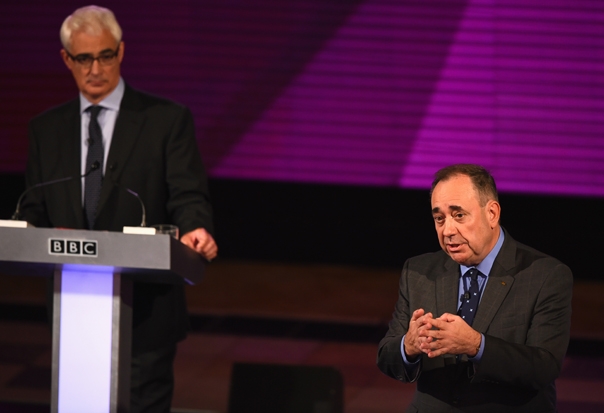[audioplayer src=”http://traffic.libsyn.com/spectator/TheViewFrom22_4_Sept_2014_v4.mp3″ title=”Isabel Hardman, Fraser Nelson and Hamish Macdonell discuss the referendum” startat=700]
Listen
[/audioplayer]Let us take a trip to America in 1976. The unelected incumbent president, Gerald Ford, is being challenged for the Republican party’s nomination by Ronald Reagan — and does not take it seriously. Sure, Reagan may have served as governor of California but, still, come on, is this Grand Old Party really going to choose a two-bit B-movie actor as its standard-bearer? And isn’t he the candidate of fruitcakes and loonies? Say what you will about Gerry Ford but you know where you stand with him.
But not everyone sees it that way. Reagan is winning in places he shouldn’t have a chance. A memo to senior members of the Ford campaign complains that Reagan’s ‘unexpected success’ is thanks to voters who were ‘unknown and have not been involved in the Republican political system before’. ‘We are in real danger,’ the memo warns, ‘of being out-organised by a small number of highly motivated right-wing nuts.’
Bang. That’s what an insurgency looks like. It is true that upstarts often fall short, though sometimes defeat is merely the prelude to victory. Reagan lost in 1976 but won four years later; Howard Dean lost in 2004 but Barack Obama won in 2008. The Scottish National Party has sung its separatist song for decades, and the rest of the country hasn’t joined in. But when things change, the common thread is the political establishment’s loss of control — and evident bewilderment.
There are echoes of this in Scotland now. The ‘no’ campaign risks being out-organised by highly motivated ‘yes’ supporters, many of whom have not previously had any great involvement with politics. The referendum is a contest between two large — and equally legitimate — visions; two ideas of who we really are. The polls are tightening and the outcome remains too close to call. This is real politics, engaging all the vital organs.
No wonder it has been so energising. From Brora to Ecclefechan, Coupar Angus to Tobermory, this is a time of great and energetic disputation. The referendum is inescapable. Something is happening and that something is important.
Of course there has been stupidity and dishonesty and some unpleasantness but, on the whole, the notable feature of the campaign has been its civility. There will be some fraying of this decency in the final, fevered fortnight but this vigorous political carnival has been good for politics and good for Scotland. It has also been a revolt against politics as usual: a cry, from the heart as much as from the head, for a different way of doing things.
A cynic would observe that getting what you vote for only delays disappointment. A cynic would be right. And yet the hope remains and it is worth something. If nothing else, the right questions are being asked. Chiefly: can’t we, as a country, do better than this?
This question is not exclusive to ‘yes’ campaigners. Facebook is stuffed with arguments, and those for a ‘no’ vote are frequently just as heartfelt and passionate as any for independence. People are asking themselves what they value and sometimes, I think, they’re a little surprised by what they find and by how much they value it. Conviction politics has returned and who, really, can be disappointed by that? It’s been as invigorating as a seaside walk on a raw and windswept spring morning.
This isn’t just a Scottish thing, either. Whatever one thinks of Douglas Carswell’s defection to Ukip, he has been one of the few MPs to recognise that the old ways of doing things are not as suitable as once they were. It is possible to reawaken interest in politics; it just takes an effort to do so.
Yessers and Nawers in Scotland agree on little, save perhaps this: the campaign has been a steroid injection for democracy. Not just because tens of thousands have returned to the electoral register but because politicians are talking about big things at last. Things that go beyond a simple ‘yes’ or ‘no’ vote. ‘Yes’ or ‘no’, change is coming. This is what politics is supposed to be about; this is what we’re supposed to want.
Many Scots have tired of this campaign, some have been disgusted by it. Of course it has sometimes been grotesque, but focusing on the inevitable shortcomings at the expense of the grandeur is, I think, a mistake. And it risks misunderstanding the forces that have driven so many Scots back towards politics, in a way that confounds pollsters and terrifies all those who had thought the idea of partition too ridiculous to take seriously.
Take it from a normally jaded unionist: in Scotland now, just for a moment, the future is infinite. Yes, the outcome of the battle for Britain looks thrillingly — terrifyingly — unpredictable. But for all the right reasons.







Comments